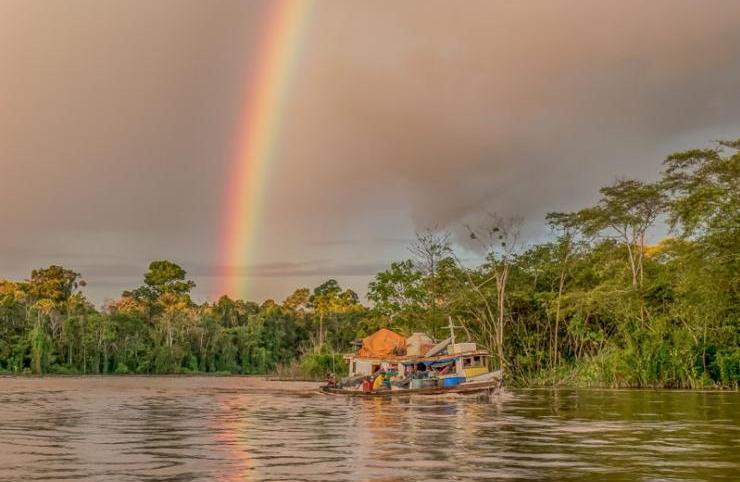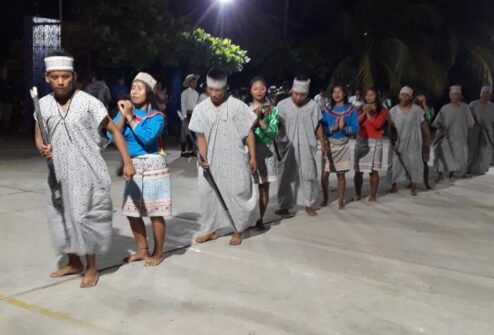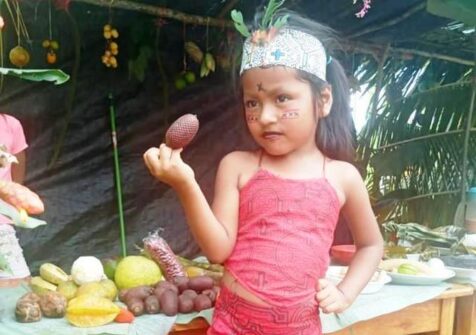Peru. The Asheninka. Mijado, the Time for Sharing.

By the word mijado this indigenous people, living in the rainforests of Peru, refers to the time of migration of fish and fishing activity, an occasion to strengthen the ties of friendship and brotherhood with loved ones, members of the same communities, or other communities. Basically, mijado is the time for sharing.
Before talking about mijado, and therefore the life and culture of the Asheninka, it is important to ask for permission to Shapishico (the guardian of the forest), the Tunchi (protector spirit of the forest), the Yakumama (the mother of all creatures of the water), the Sachamama (spirit mother of the forest) and the other sacred beings of the Amazon rain forest. At the same time, one must invoke the spirits of the ancestors of these indigenous communities, who are the owners and guardians of these lands.
The native communities of the Amazon region refer to mijado as the time of migration of fish from the South to the North to deposit their eggs. Fish travel in large schools to reach safe places in order to deposit their eggs and guarantee the maintenance of species. So, one can also define mijado as the time of fertility and of abundance of river fish.

However, mijado, among the Asheninka, is not only the moment of fish migration, but it is the occasion for sharing and exchanging experiences with ayomparis (friends). It is the time for strengthening the ties of brotherhood with their neighbouring communities, as well as the time for bartering or exchanging products.
It is an opportunity to celebrate life by savouring different kinds of fish cooked in different ways such as grilled fish, or patarashka (seasoned and cooked fish wrapped in banana leaves), fried fish, fish soup and several other fish dishes. On these occasions food is shared with everybody, nobody can be excluded during the mijado time. In this moment of the year fish is also stored for the winter when river level begins to rise and makes it difficult to fish.

It is clear, therefore, that the Amazonian mijado is not only the time of fish migration and fishing activity, but it is also a time to reaffirm the ancestral spiritual identity of the Asheninka. Mijado takes place in a specific period of the year and in specific places which are blessed by the Yakumama (the mother of all creatures of water). On one occasion when I was in the land of this indigenous group I asked a girl where her father was and she replied in her language: “Riyaatati apa eniki royeeri otiyaarentsi” (My father is at the river to wait for mijado). Mijado cannot take place just at any time or in any place. Mijado fishing rituals in the Amazon region are generally performed in summer, between June and August. The Asheninka have set rules regarding fishing activity. They are supposed to catch fish just for food purposes and small fish, when caught, must be returned to the water in order to safeguard numbers.

According to oral narratives, the traditional cultural and spiritual event related to mijado has been practiced since ancient times among the Asheninka. The river communities and nearby settlers used to go to specific places to catch fish with artisanal tools such as hooks and nets which did not have any negative impact on environment.
The Asheninka ancestors caught only the necessary amount of fish for family and community sustenance. The tradition of mijado is well known at regional and national level, but over the generations this custom has lost that essence that characterised it as something spiritual, becoming a more commercial event. Besides, nowadays equipment for larger catches such as fishing nets of different sizes are used in order to increase fish catch, because the real ancestral meaning of mijado that is ‘sharing’ went lost, and so mijado has become a commercial event indifferent to its impact on the aquatic ecosystem and on the fishing resources of the rivers in the Amazon region. And what is more, the Asheninka are not the ones who benefit from the ‘commercialization’ of mijado, but those big merchants who arrive from the cities and who loot the resources of the indigenous communities of the Amazon. (Open Photo: ©123mn/123RF.COM)
Jhonny Mancilla Pérez



